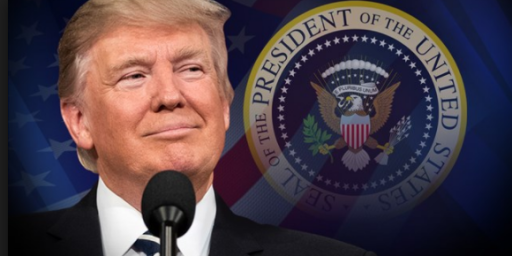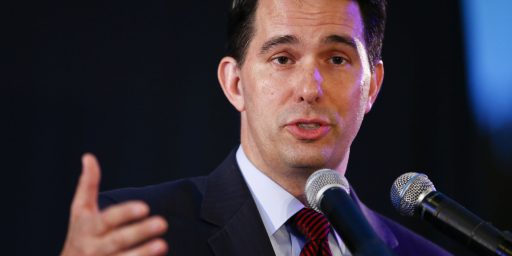The Tea Party and the War on Drugs
 Economist, libertarian, and outspoken critic of the war on drugs, Jeffery Miron, wonders about The Tea Party and the Drug War over at NRO.
Economist, libertarian, and outspoken critic of the war on drugs, Jeffery Miron, wonders about The Tea Party and the Drug War over at NRO.
As the elections near, however, voters will want to know where the [Tea] party stands not just on the economy but on social issues. A perfect illustration is drug policy, where conservatives advocate continued prohibition but libertarians argue for legalization. Which way should the tea party lean when this issue arises?
He goes on to get to the heart of the matter in terms of fiscal issues:
Fiscal responsibility means limiting government expenditures to programs that can be convincingly said to generate benefits in excess of their costs.
[…]
Any significant expenditure, however, should come with a credible claim that it produces a benefit large enough to outweigh both the expenditure itself and any ancillary costs. From this perspective, drug prohibition is not remotely consistent with fiscal responsibility. This policy costs the public purse around $70 billion per year, according to my estimates, yet no evidence suggests that prohibition reduces drug use to a significant degree.
Indeed, such was at least, in part, the point of two of my recent posts: Breaking!! Drug War not Working and Drug War 101: Drug Control Budget.
Miron continues:
And prohibition has unintended consequences that push its cost-benefit ratio even farther in the wrong direction. Prohibition generates violence and corruption by pushing drug markets underground and inflating prices. Prohibition inhibits quality control, so users suffer accidental poisoning and overdoses. Prohibition destroys civil liberties, inhibits legitimate medical uses of targeted drugs, and wreaks havoc in drug-producing countries.
He also appeals on the personal liberty front:
drug prohibition is hopelessly inconsistent with allegiance to free markets, regardless of the level of government. Free markets should mean both that businesses can operate as they please and that individualscan purchase and consume whatever they want, so long as these actions do not harm others, even when such decisions seem unwise. Drug prohibition interferes with precisely these activities.
One suspects, however, that a lot of Tea Party adherents are socially conservative, and would not be amenable to the above arguments, but that is just a guess in the absence of hard data.
No doubt, Miron’s main goal here is to bring more attention to the failed nature of the drug war, as the Tea Party movement does not constitute a coherent political force that can be said to hold a shared platform. However, he is correct that the Tea Partiers tend to claim, at least in a vague sense, the label of libertarianism. As such, the question as to the general disposition of the typical Tea Party Patriot on this issues is a fair one.






One suspects, however, that a lot of Tea Party adherents are socially conservative,
Oh, I think one suspects there’s nothing remotely coherent in the tea party. The unifying ideologies are incoherent rage, cultural paranoia and racial animus.
I’ve got a good catch-all answer to the question: “Which way should the tea party lean when this issue arises?”
Answer: Who cares?
I would actually take it a step further, where Libertarians even argue that prostitution should also be legalized and argue against any federal ban on abortions. They also heavily support legalizing gay marriage. I’d be willing to wager that most in the Tea Party would be firmly against those as well. It does shed some light on whether the movement is still truly a Libertarian animal regardless of origins, but “liberals” who support these ideas might see the opportunity to latch onto the Tea Party movement and point these things out.
As to the whole question of who cares… I would think that before joining a particular political movement it might matter to me where they stood on various issues, so I’d say… Anyone who belongs to such a movement should care, unless you’re just joining a group for the sake of joining a group.